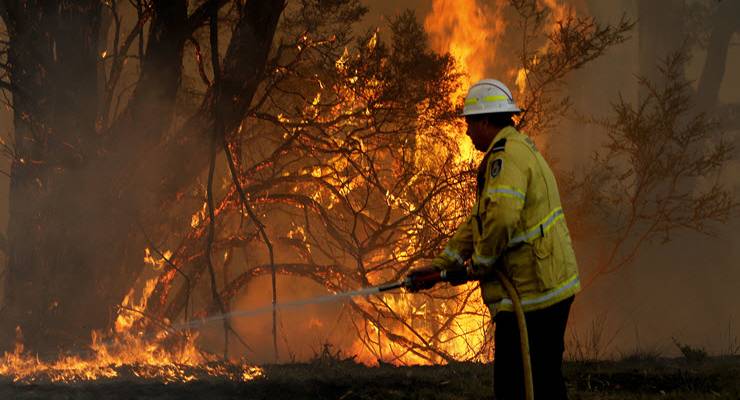
This is part four in a series. Read parts one, two and three.
Australia’s capacity to respond to and manage the psychological impact of large-scale disasters such as last season’s catastrophic bushfires is being eroded by an unlikely source — the Department of Veterans’ Affairs (DVA), which is shutting itself off from independent scientific input even as its own expert base shrinks.
That’s the view of Professor Alexander McFarlane, a psychiatrist and global expert on post-traumatic stress disorder (PTSD) and disaster responses, who gave a strongly worded submission to the Royal Commission into National Natural Disaster Arrangements.
McFarlane said knowledge gained from studying Australian soldiers deployed to warzones and peace keeping missions had often been used following civilian disasters.
To make veterans feel comfortable, wrote McFarlane, past research had been conducted by university specialists with oversight by scientific advisory teams that included veteran representatives, who has worked with DVA and the Australian Defence Force for decades.
That model is under threat.
The Centre for Traumatic Stress Studies (CTSS) at Adelaide University was forced to close at the end of last year after funding from DVA and the Australian Defence Force — its two biggest financial backers for a decade — ran out. That was despite CTSS conducting the most comprehensive research into our veterans in 2015.
“DVA used to have a staff of epidemiologists and medical personnel who played a central role in policy development, in the context of the international literature, about the hazards of military service and the necessary health interventions,” McFarlane wrote.
“As DVA has downsized, this capacity to use technical knowledge has been lost and it is a department that now functions with no systematic awareness of this international literature. The loss of this expertise and knowledge puts Australia’s response to major disasters at risk as DVA has previously been an essential repository of experience and knowledge about the impacts of traumatic stress and how to optimally manage its effects.”
The royal commission will deliver a final report by October 28 on Australia’s preparedness for and response to natural disasters, drawing on what many people experienced during the recent bushfires.
Globally, McFarlane is almost without peer on the health impacts of disasters.
He spent seven years treating 300 survivors of the 1983 Ash Wednesday bushfires. He wrote a report for the UN Compensation Commission and the World Health Organization about the Iraqi occupation of Kuwait. He conducted reports on the health impacts of the 1996 Port Arthur massacre, the 2002 Bali nightclub bombings, the 2004 Boxing Day tsunami and the 2009 Black Saturday bushfires.
McFarlane will also be the sole author of a report into future health needs following the 2017 Grenfell Tower fire disaster in London.
As an example of DVA’s “failure of institutional memory”, McFarlane cited the department’s decision to abandon the Deployment Health Surveillance Program established by former veterans’ affairs minister Bruce Scott, despite $30 million spent to collect baseline data. Data was gathered on all deployments after 2002. The populations were to be followed-up with over the long term to establish health consequences. There had been no systematic monitoring of serving personnel since 2011, McFarlane told me.
“This program has the potential to inform critical knowledge about long-term effects of trauma and environmental exposures that are central to the management of disasters,” McFarlane wrote in his submission.
DVA has engaged the Australian Institute of Health and Welfare, a federal body, to do much of its health surveillance of veterans without “adequate consultation with the university sector or veterans”.
“This approach is out of keeping with the model of independent research, external to government bodies, that is undertaken by all our major allies. This research capacity in the tertiary sector is an essential national asset that can assist in disaster research and management,” McFarlane said.
Speaking generally, McFarlane said knowledge and skills need to be developed and sustained between disasters. Doing so depended on bureaucracies being open to having policy decisions subject to scientific scrutiny. Contrary views should be “openly aired without retribution in terms of the withdrawal of finances or the targeting of individuals who raise concerns”.
DVA did not respond when asked what it thought of McFarlane’s submission.
Dean Yates was a journalist with Reuters, the world’s largest news provider, for 26 years until early 2020.
For anyone seeking help, Lifeline is on 13 11 14 and Beyond Blue is 1300 22 4636. Open Arms — Veterans & Families Counselling is on 1800 011 046, and the ADF Mental Health All-hours Support Line is 1800 628 036.







Thank you for writing this and also including the broader implications as it really feels under reported.